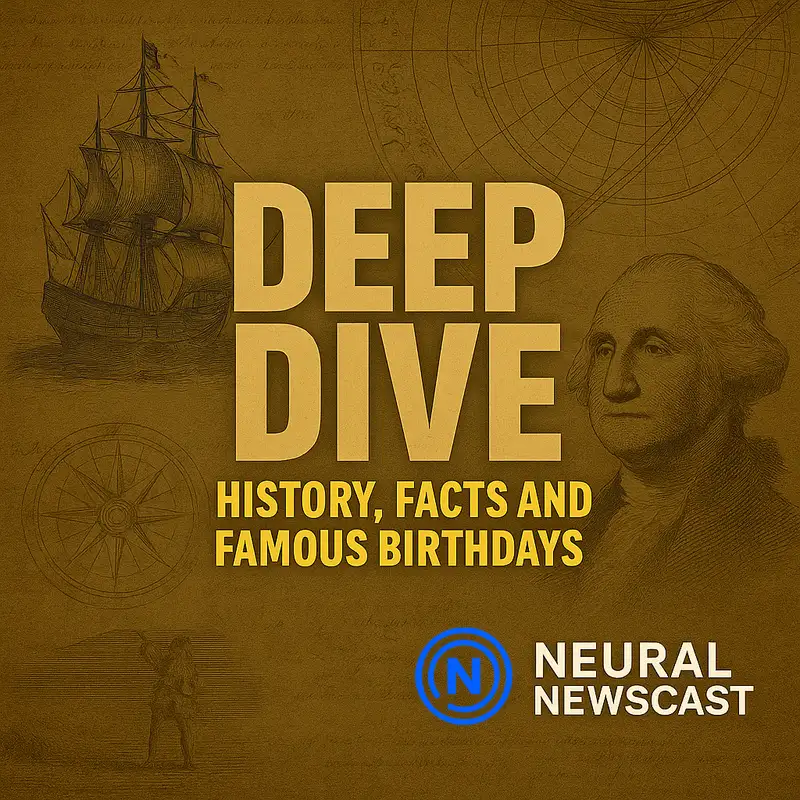Deep Dive: V‑J Day Reverberations, Mandela’s Long Game, and the Octopus’ RNA Trick - August 14, 2025
The News You Need, powered by AI and reviewed by humans.
Welcome to Neural Newscast.
Thanks for joining us for this Neural Newscast deep dive.
I'm Andrew, and alongside Monica, we're about to uncover some intriguing stories.
Today in 1945, Japan's announcement of surrender finally closed a six-year chapter of global
conflict, an instant that shifted everything on battlefields and in living rooms alike.
The word surrender belies the complexity. This was the culmination of years of diplomacy,
relentless campaigning in the Pacific, the shock of Hiroshima and Nagasaki,
and an exhausted global community pressing for an end.
Right, and the timing mattered.
Emperor Hirohito's radio address on August 15 was the first time many Japanese heard his voice,
a surreal moment that stopped a nation mid-breath and reordered loyalties overnight.
Internationally, it was seismic.
Capitulation meant not only ceasefires but massive logistical challenges,
repatriating millions, securing occupied territories,
and beginning a legal reckoning for wartime actions.
You have to picture the contrast.
In cities across the Allied world, spontaneous VJ Day celebrations erupted.
People pouring into streets, cheering, kissing strangers.
While in Asia, scenes were often rar, with relief tangled up in grief.
And for diplomats, the announcement launched a new phase,
how to martial occupation policies, rebuild governance in Japan,
and prevent a power vacuum that could invite chaos or new conflicts,
especially with the Soviet Union already moving in.
It also reshaped the map of US global leadership.
America emerged with unparalleled military reach and a sense of responsibility,
some would call it stewardship, that steered post-war institutions and the Marshall Plan that followed in Europe.
Don't forget the human dimension, millions of service members awaited orders home.
Families reconvened, but countless civilians and veterans were left to process trauma and loss.
Reconstruction wasn't just brick and mortar, it was psychological too.
And the legal aftermath, the Tokyo Trials, tried to put a framework around accountability,
which set precedents for how the world prosecutes wartime leaders,
imperfect as those processes were.
It also forced nations to confront questions about colonial territories.
Decolonization accelerated as the imperial powers were weakened,
and that reshaped international relations for decades.
There's that poignant irony.
A single line of text in an announcement ended active battle, yet opened a labyrinth of political, social and moral work that lasted generations.
Exactly.
Vijay Day was both closure and beginning, a moment of jubilation that masked unresolved tensions,
but it also created the conditions for the institutions and alliances that would seek to prevent a repeat.
Standing back, it's clear why historians mark that announcement as a hinge point, not just the end of a war, but the start of a world being remade.
And for people alive then, the memory is visceral, relief, sorrow, accountability, and a cautious hope, all bundled into a single historic day.
Today we celebrate the birthdays of Marie Curie, 1867, Nelson Mandela, 1918, and Aretha Franklin, 1942.
That's a powerful trio, Andrew, science, liberation, and music.
But let's zero in on Nelson Mandela today and what made his arc so globally resonant.
Mandela's life reads like an epic of transformation, from rural Eastern Cape beginnings to law student to Rivonia trial defendant to 27 years behind bars, and then to the presidency that helps steer South Africa away from civil war.
And that evolution wasn't scripted or inevitable. It was strategic. He mastered the long game of moral authority, legal knowledge, and coalition building, which is why diplomats and leaders still study his approach.
People often focus on the prison sentence and the grand gestures, but I find the tactical
patience fascinating, how he used correspondence, legal defense, and quiet diplomacy inside
Robin Island to keep networks intact.
That continuity mattered when he walked out.
Little known detail, Mandela became something of an archivist while imprisoned, memorizing
documents and speeches so he could continue educating comrades that intellectual stewardship
preserved institutional memory for the ANC.
And on release, he didn't push for retribution, he leaned into reconciliation, famously
establishing the Truth and Reconciliation Commission, which was imperfect but innovative.
a judicial and moral experiment in nation-building.
It was a diplomatic gambit as much as a domestic one.
Mandela understood that international legitimacy, sanctions relief, foreign investment, diplomatic
recognition depended on a credible commitment to stability and inclusion.
His presidency also balanced enormously competing pressures, an economy unequal by design, rising expectations among black South Africans, and the white minority's fears.
He prioritized symbolic unity, even when structural reforms slow walked.
And personally, he cultivated a brand of humility and humor that endeared him worldwide, dancing at public rallies, publicly forgiving foes, which amplified soft power in ways textbooks rarely capture.
There's also the bit about his courtroom presence.
During the Rivonia trial, he used the stand to deliver a political manifesto rather than
plead for mercy.
That speech refrained him from criminal to freedom fighter in the global imagination.
Right, and that rhetorical skill is why foreign ministries leaned in.
He spoke with legal precision and moral conviction, making it easier for allies to justify backing
the anti-apartheid cause.
On the flip side, his compromises after 1994 left critics who wanted faster economic redistribution.
But perhaps that tension underscores the reality of transitions, idealism meeting political arithmetic.
And it's worth noting his influence beyond South Africa.
Mandela became a template for conflict transformation, how to negotiate exit strategies,
craft power sharing, and use moral leadership to legitimize new institutions.
One thing I keep coming back to is his longevity as a symbol.
Mandela's image was flexible enough to be invoked by presidents and protesters alike,
which speaks to the depth of his moral capital.
That moral capital has limits, but its endurance is instructive.
Current leaders still reference his example when confronting polarized societies,
and international mediators study his negotiation patterns.
So as we mark his birthday, it's less about hagiography and more about a living repository of lessons,
restraint, strategy, and the politics of reconciliation.
And a lasting legacy is clear, not just a statue or a day,
but a set of practices in leadership and diplomacy that remain relevant
when societies grapple with truth, justice, and rebuilding.
which is why remembering Mandela today matters.
His life continues to shape how we think about transition, forgiveness,
and the hard work of building an inclusive political order.
Stay with us. More Deep Dive Exploring coming up.
This is NNC, Neural Newscast.
We're here every day with reliable, fast-paced reporting that combines
the speed of AI with the judgment of real people.
Find our full archive at neuralnewscast.com.
And we're back with more from Neural Newscast Deep Dive.
You ever think about how octopuses can edit their own RNA in real time?
Basically rewriting genetic instructions as neurons fire?
It's like biology's version of a live patch update.
It sounds like science fiction, but it's real, especially encephalopods where RNA editing alters proteins in the brain to tune neural function without changing the DNA blueprint.
That plasticity is astonishing.
The implications blow my mind.
An animal that can dynamically adapt protein function to temperature swings or new behaviors on the fly,
faster than evolution would normally allow.
And that has huge geopolitical echoes too.
Think biotech horizons.
Understanding that mechanism could influence how nations approach adaptive therapies.
Bioengineering, even regulatory frameworks.
Right, and from a storytelling angle, it's irresistible.
An intelligence so flexible it can reprogram its own molecular level responses during life.
No waiting for generations.
It's immediate adaptability.
Which raises questions about what we define as fixed in biology.
If RNA edits are reversible and environment driven,
our models for neuroplasticity need retooling.
It's not just synapse remodeling, it's molecular recalibration.
There's also an evolutionary trade-off to consider.
Octopuses invest in RNA editing rather than permanent DNA change, suggesting a strategy for unpredictable environments,
short-term flexibility over long-term genomic alteration.
And when you map that onto human tech and policy, it complicates things,
should we pursue similar adaptive edits therapeutically,
knowing they might be transient or context-dependent.
Governance can't be static.
Scientists are already looking at how these edits affect ion channels and neurotransmitter receptors.
Tiny changes with big effects on behavior. It reframes how we study cognition in non-mammals.
Plus, it challenges assumptions in comparative neurology.
Cephalopod intelligence isn't just convergent behaviorally.
It's supported by a fundamentally different molecular toolkit.
I love that. Different toolkit, similar outcomes, complex problem solving, camouflage, even social learning, all enabled by this molecular nimbleness.
And that nimbleness might be part of why cephalopods thrive in varied oceanic niches.
A flexible nervous system gives them a survival edge as conditions shift.
There's an ethical layer too. If we learn to mimic or harness RNA editing, we need international norms.
Biocapabilities like this tend to outpace treaties.
Exactly. Diplomats and scientists will need to collaborate closely to balance innovation with safety, something we've seen in other emerging tech arenas.
For listeners, the takeaway is simple but profound. Life has evolved molecular improvisation.
organisms rewriting their own instructions in response to the world, in real time.
And that insight expands both our scientific curiosity and our responsibility,
how we study it, how we apply it, and how we regulate the possibilities that follow.
Thanks for tuning into our Deep Dive.
I'm Monica and from Andrew and the Neural Newscast team.
We'll see you next time.
For daily AI-powered news, with a human touch, subscribe to Neural Newscast on your favorite
platform, or visit our archive to find all past episodes and current shows, neuralnewscast.com.
Neural Newscast integrates real and AI-generated voices to facilitate efficient, high-quality
news production. Developed by human experts, our AI-generated content undergoes rigorous
fact-checking and human review before publication.
While we strive for accuracy and neutrality,
AI-generated content may occasionally contain errors.
We encourage listeners to verify crucial details from reliable sources.
For more on our AI transparency practices, visit newscast.com.
Creators and Guests




